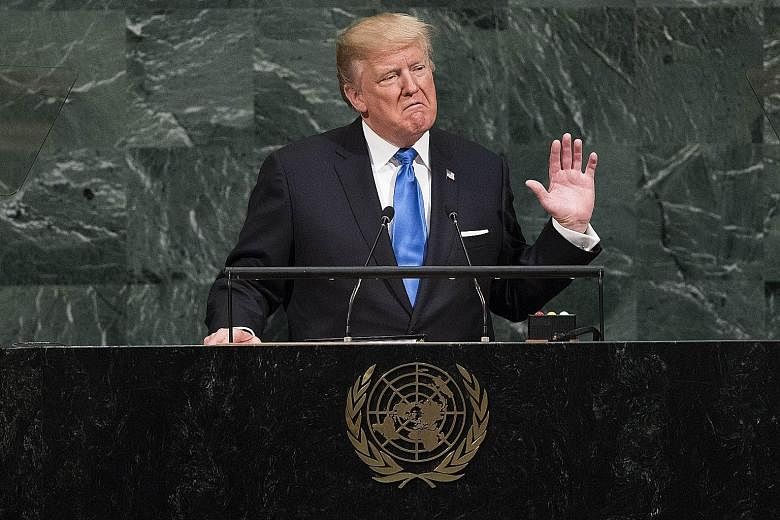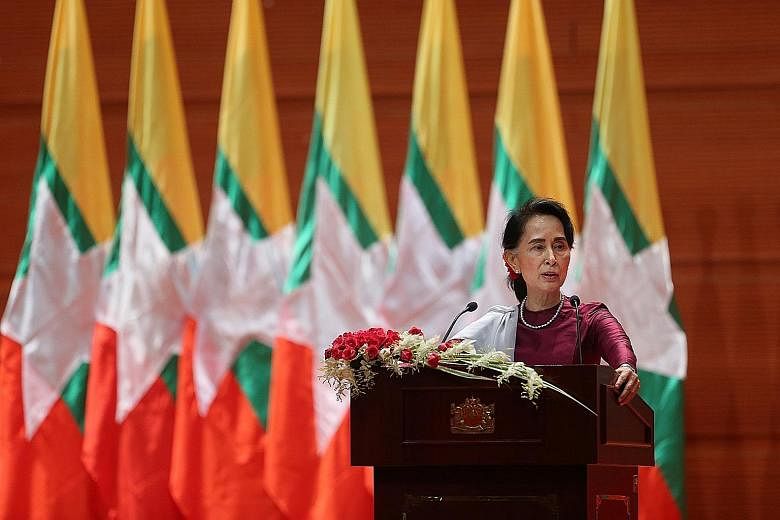This is a fortnightly round-up of FAQs, pegged on news events, published on The Straits Times' website. Go to http://str.sg/Z9Zr for more.
Elections in New Zealand and Germany, and rhetoric at the United Nations General Assembly, dominated international headlines in the past fortnight. ST Explainers delves into the facts behind the elections, and two highly anticipated speeches - by United States President Donald Trump and Myanmar leader Aung San Suu Kyi.
Trump's and Suu Kyi's speeches closely watched
US President Donald Trump delivered his first speech at the UN General Assembly on Sept 19, in the wake of rising tensions with North Korea. Mr Trump once again addressed his strongest remarks to North Korea, saying that the US will be forced to "totally destroy" the North unless Pyongyang backs down from its nuclear challenge. Beyond North Korea, he also reiterated his "America first" agenda as well as denounced the Iran nuclear deal. ST Explainers distils six key points from his speech. http://str.sg/4jPE
Another leader who delivered a closely watched speech was Myanmar's civilian leader Aung San Suu Kyi, who broke her long silence on the Rohingya crisis in a nationally televised speech on Sept 19. While she expressed concern for the "suffering of all people", she refused to blame any group for the violence in Rakhine. We look at the five key points from her 30-minute speech and set them in context. http://str.sg/4jdL
Who's who at this year's UN General
Assembly The UN's annual General Assembly has been dubbed the Super Bowl of diplomacy, an annual gathering of the most powerful leaders from around the world. We look at who are some of the leaders attending the gathering of the 193-nation body and why North Korea is getting a front-row seat this year. http://str.sg/4jdu
Since then US President Harry Truman addressed the inaugural General Assembly in New York in 1946, the event has been a platform for American presidents to declare their views of the world. ST Explainers looks at key addresses by former presidents, from Jimmy Carter and Gerald Ford to Ronald Reagan and Bill Clinton, and what they said about America's place in the world order. http://str.sg/4jno
North Korea's new headliner: Foreign Minister Ri Yong Ho
The UN General Assembly has also made an unexpected celebrity out of North Korean Foreign Minister Ri Yong Ho, who has been making headlines, comparing Mr Trump to a barking dog, calling him "Mr Evil President" and saying he feels sorry for Mr Trump's aides. Learn more about North Korea's top diplomat at http://str.sg/4jy2
NZ election ends in stalemate as ruling party fails to win majority
New Zealand went to the polls on Sept 23 and Prime Minister Bill English's ruling National Party fell short of a majority. A renewed opposition Labour Party, led by Ms Jacinda Ardern, will have to engineer a three-way coalition with New Zealand First and the Green Party to oust Mr English from office.
ST Explainers looks at the key players in the election (http://str.sg/4j2j), as well as the issues voters are concerned with (http://str.sg/4j2r). We also look at how Ms Ardern, the 37-year-old Labour leader who derailed Mr English's plans for a rare fourth term, has rejuvenated support for the party. http://str.sg/4jnF
Merkel wins German polls, but faces tough contest from far right
Chancellor Angela Merkel sought and won a fourth term in Germany's election on Sept 24. But her victory was marred by gains by the far-right Alternative for Germany (AfD) party, the first such party to join the German Parliament in more than 50 years. We look at what the election results mean for Germany. http://str.sg/49kZ
AfD won 15 per cent of the votes and became the third-largest party in Parliament. For a quick look at this far-right party and its agenda, go to http://str.sg/49ks
For a more light-hearted look at Germany's election campaigns, go to http://str.sg/4jnA for our round-up of some quirkier moments, from Dr Merkel's most revealing interview to date (with a group of schoolchildren) to far-left Linke candidate Gregor Gysi campaigning for a revival of nudism.
Abe dissolves Japan's Parliament, calls for snap polls on Oct 22
Japanese Prime Minister Shinzo Abe dissolved the Lower House on Sept 28 for a snap election. This is more than a year ahead of when polls are due, and there will be 465 seats up for contest.
We look at five reasons why Mr Abe is choosing to call for an early election. http://str.sg/49ZL
With snap polls confirmed for Oct 22, find out more about Mr Abe, who came to power in 2006 and made a rare comeback as prime minister in 2012. http://str.sg/49Ui


